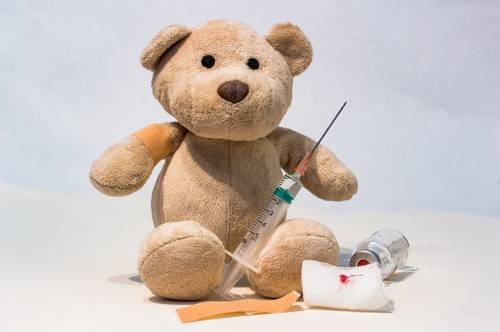Debunking Vaccination Myths
Hits: 3670
 In the last 20 years, the medical community has started to see a fall in the rate of vaccinnations as parents actively choose not to vaccinate their children due to a growing concern over the safety of vaccines and their potential risks and side effects.
In the last 20 years, the medical community has started to see a fall in the rate of vaccinnations as parents actively choose not to vaccinate their children due to a growing concern over the safety of vaccines and their potential risks and side effects.
This has led to a resurgence of vaccine-preventable diseases once thought to have been conquered in advances in medical research.
We will take a look at some of these concerns and show you that they are not supported by medical research. In fact, parents who choose not to vaccinate their children are putting their children’s health at risk of diseases which have serious debilitating and even fatal consequences.
Myth 1: There is a link between vaccines and the development of autism in children
A study published in 1998 in The Lancet, a reputable medical journal, suggested that there was a possible link between the incidence of autism in children and the vaccine against measles, mumps and rubella. This understandably sparked great concern amongst parents especially after the media reported these findings. In the midst of this controversy, some parents (particularly in Canada, USA and UK) who were unsure of what to do, chose not to immunise their
children, resulting in a significant increase in the number of cases of measle and mumps.
However, after extensive research and investigation, the study has since been discredited as it was found to have serious procedural inconsistencies and undisclosed conflicts of interest. The article was finally retracted in 2010 and the leading author of the study Andrew Wakefield lost his medical license.
Ref: The MMR vaccine and autism: Sensation, refutation, retraction, and fraud
Although we still do not know the true causes of autism, several studies have shown that symptoms of autism develop way before the children received their MMR vaccines and may even begin while the child is developing in the uterus, thereby debunking the idea that the MMR vaccine could in any way cause autism in children.
Ref: Direct Evidence that Autism Starts During Prenatal Development, Autism Speaks, March 26 2014
Myth 2: There is no need for vaccination given that there are adequate levels of hygiene, sanitation and clean water
Whilst it is true that better standards of hygiene and sanitation have helped to stem the spread of infectious diseases, one still cannot discount the role of vaccines. Vaccines are still necessary because many infections can still spread no matter how clean we are.
This can be supported by the fact that the rates of infection of measles in Singapore fell significantly following the introduction of compulsory vaccinations in 1985. However, there were about 148 cases of measles reported in 2011 (triple the number reported the previous year). This was found to be due largely to single sporadic cases among kids under five, most of whom were unvaccinated as a number of parents who had inadvertently forgotten to get their children vaccinated whilst others were too unwell to receive their jabs.
Ref: Straits Times 5 Dec 2012 Missed jabs led to more measles cases
This shows that the failure to vaccinate could very quickly lead to a resurgence of these diseases no matter the standard of hygiene or sanitation.
Myth 3: Vaccines are not safe as they may contain toxins
Licensed vaccines need to undergo vigorous testing across various phases of trials before they are even approved for use. They are also carefully and continually monitored for safety.
Some may have concerns about the use of certain elements like aluminium or mercury in vaccines. However, there are only trace amounts of these chemicals in approved vaccines and therefore not enough to be toxic to the human body. There is no scientific evidence to show that chemicals such as mercury or aluminium used in such low level are in any way harmful to the body.
Myth 4: Our bodies can develop natural immunity to diseases. There is therefore no need for vaccines
While it is true that the human body is perfectly capable of developing its own immunity against a disease and in some cases this may result in a stronger immunity than a vaccination, the risks of such an approach far outweigh the relative benefits. In order for your body to develop natural immunity, you must first catch the disease and fall ill. Unfortunately, this also means that it puts you at serious risk of developing severe complications which may lead to cognitive impairments or even death.
Myth 5: There is no longer any need for vaccinations as the incidence of these diseases is so low
 Although the incidence of vaccine-preventable diseases is very low in most developed countries, there is still a risk of catching the disease given the interconnectivity of our world today. It is therefore important that we get ourselves vaccinated so that we can protect ourselves and the people around us.
Although the incidence of vaccine-preventable diseases is very low in most developed countries, there is still a risk of catching the disease given the interconnectivity of our world today. It is therefore important that we get ourselves vaccinated so that we can protect ourselves and the people around us.
It is true that if most of the population is vaccinated against these diseases, there is a very much reduced risk of catching the disease.
However, this may change if too many people choose not to vaccinate themselves or their children, giving the viruses and bacteria an opportunity to re-establish themselves. If we actively choose not to vaccinate our children, we are also putting the more vulnerable people in our community especially those who are not well enough to receive these vaccinations.
Myth 6: When I vaccinate my child, I risk him or her being infected with the very disease it is trying to prevent
Most people will develop mild symptoms shortly after receiving a vaccination (eg. a low grade fever). These symptoms sometimes mirror the ones of the disease that the vaccines are designed to protect against. However, this does not mean that the person is being infected by the disease. He or she is merely experiencing the body’s immune response to the vaccine not the disease itself.
Myth 7: I am afraid that my child will develop an allergic reaction to the vaccine
The benefits of vaccination greatly outweigh the risks. The fact is that many children have been successfully vaccinated for decades.
This has saved countless lives merely because vaccines prevent disease.
The risk of developing an allergic reaction resulting in death or severe side effects are extremely low (usually described as being about 1 case in every one or two million injections) whereas there is strong medical evidence to suggest that one can develop serious side effects and complications when one actually catches one of these potentially deadly diseases.
Conclusion
As one article so aptly puts it, “Parents who choose not to vaccinate often do so to avoid risk, but choosing not to vaccinate is the riskier choice.”
Further Reading
The article above is meant to provide general information and does not replace a doctor's consultation.
Please see your doctor for professional advice.
